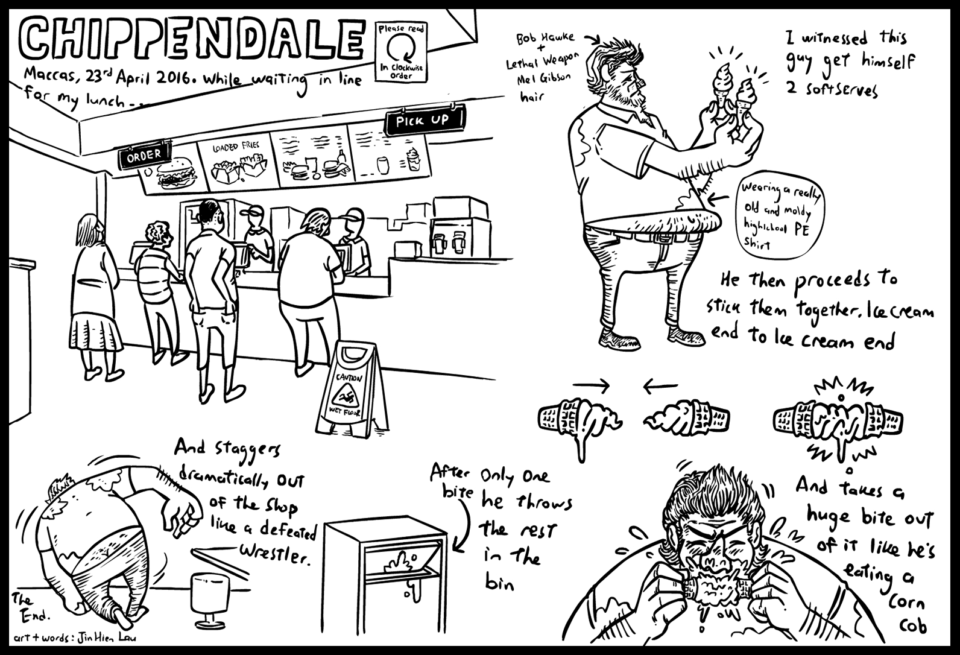The toilet key is on the reception desk. You have to get up and ask for it. The loo’s in the stairwell. The fire door locks automatically, so you need a key to get out again. It’s a lousy design in a cheap old building. Perfect for petty humiliation. Ideal for a Job Network provider.
I’m sitting here gritting my teeth through the three-mornings-a-week office attendance my job plan demands. It hampers my efforts to get a job. But getting unemployed people into work isn’t the point. Our role is to be the terrible object lesson to hold up to others, the ‘leaners’ to be punished for our moral failings, a bone thrown to the Calvinist far-right and the screamers in the tabloid press. A collective whipping boy.
Sadly but predictably, there are plenty of private providers willing to take on the burden of humiliating people who can’t fight back. You could be forgiven for suspecting some of their staff quite enjoy it. Obviously, a few of the people they deal with can be difficult. Maybe a bit slow, some clearly unwell, others a bit bolshy. But they’re people, entitled to civility and not getting it. Adults, not recalcitrant children. Not livestock. Not to be shouted at or patronised.
The toilet key exemplifies the general approach. Hanging it on a wall near the office exit would work just as well, without the need to approach a staff member’s desk, effectively putting your hand up to ask to go to the toilet. One genteel, fiftyish woman couldn’t stomach it, left the office, and went to the nearby shopping centre for a wee. She was sitting on the loo when the agency rang, asking why she’d left. On her return, she was publicly rebuked and kept back to make up the minutes her little blow to human dignity took. She’s cowed now. I suspect she holds it in until she gets home.
Most of the group are mystified about why we need to be there, except for the brute fact that our dole payments depend on it. These days, applying for the dole involves choosing from a list of Job Network providers and signing a contract with one of them. The standard contract, offered to a powerless, broke person, stipulates that after three months on the dole, applying for a minimum 20 jobs a month, unemployed people must spend three hours a day, three days a week at the office of their Job Network provider, being ‘intensively case managed’. In practice, that means using an antiquated computer with inadequate software, while a staff member invigilates.
We’re given a range of reasons for this. Ostensibly it’s to stop welfare fraud – claiming the dole and working as well. After some spirited questioning, I finally got one person who worked there to admit the regime is entirely aimed at punishment. He’s just a flunky. He doesn’t actually know. But he briefly had to confront the realisation that he’s working in the penal system. Small victories.
He’s right though. The Unemployed Workers Union advises that the deed between agencies and the government covers only one appointment per month, and clients can’t be compelled to attend more… except when they sign a contract presented as a take it or leave it proposition. The union told me:
‘Unfortunately, the system is punitive, and dealing with the agencies is like a game of tennis: they hit the ball into your court, you pick it up, analyse it, work it out and hit it back. They do the same and the game goes on. It is designed this way to deter people from being on welfare, as it’s just too hard and they drop out, saving the government money. The job agencies are just Centrelink compliance offices.’
This institutionalised cruelty is unlikely to provide any of its victims with a job. Indeed, it actively works against it. It encourages short-term thinking. It’s drummed into you that you must apply for 20 jobs or more or your payment will be stopped. When all the money you have depends on those 20 applications, you’re terrified there won’t be 20 jobs to apply for next month. Then it makes sense to stockpile job possibilities that are likely to be advertised for a while, instead of applying straight away. Or, if you’re low on numbers, it makes sense to apply for jobs you have little chance of getting. It makes sense to waste your time and that of others. At least your dole is safe for another month.
Even if the stars align, you’ve hit the magic 20, and a job comes up while you’re under observation, applying for it while you’re there is out of the question. Having your application and CV properly formatted is obviously vital, but the agency’s computers don’t have Microsoft Word loaded. It’s industry standard: every employer will be reading our applications in Word. We have no choice but Google Docs, which changes the formatting of any Word document, and can’t deal with tabs, which CVs tend to have. But it’s free – apparently all we’re worth.
There’s no guarantee you can even use these inadequate tools to search or apply for jobs. My first week, the network was down most of Tuesday and all of Wednesday and Thursday. The next week, the monitor on my computer died. Three weeks later, it’s still not replaced. Today, two people were told, “All the computers are full today. You’ll have to use your phone.”
For this we’re wasting not just time, not just energy, not just opportunities to apply for jobs, but the money for 12 bus fares or six parking fees a fortnight. With $538.80 (63 per cent of the poverty line level) to cover living expenses for that period, that little bit hurts.
All of this hurts. And not just the person trying to get a job: employers swamped with futile applications, even the Job Network prison guards. It breeds – and nourishes – contempt and intimidation. It’s our border protection and refugee policies writ small. Almost as small as the people who designed them.





